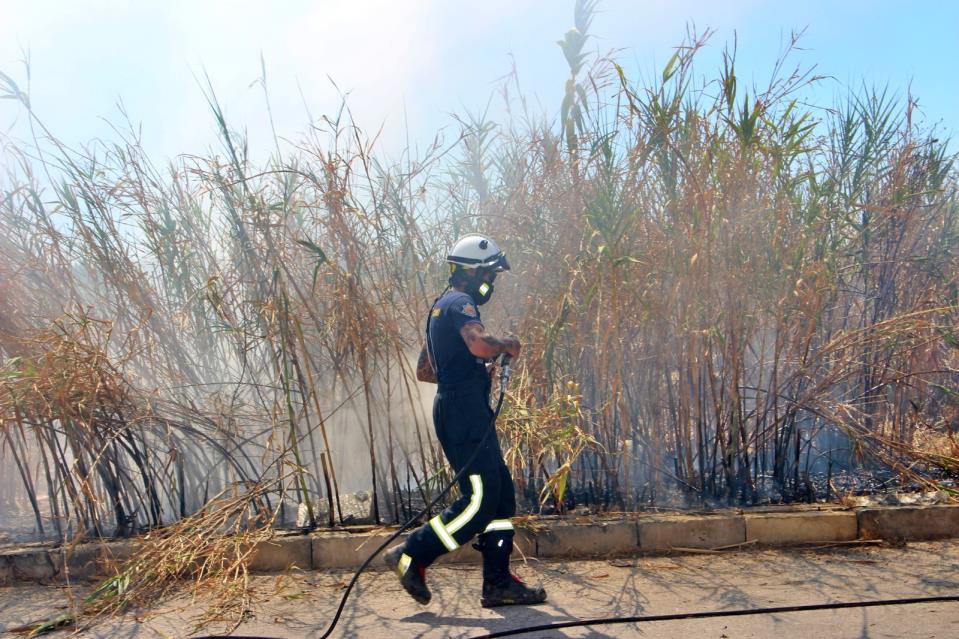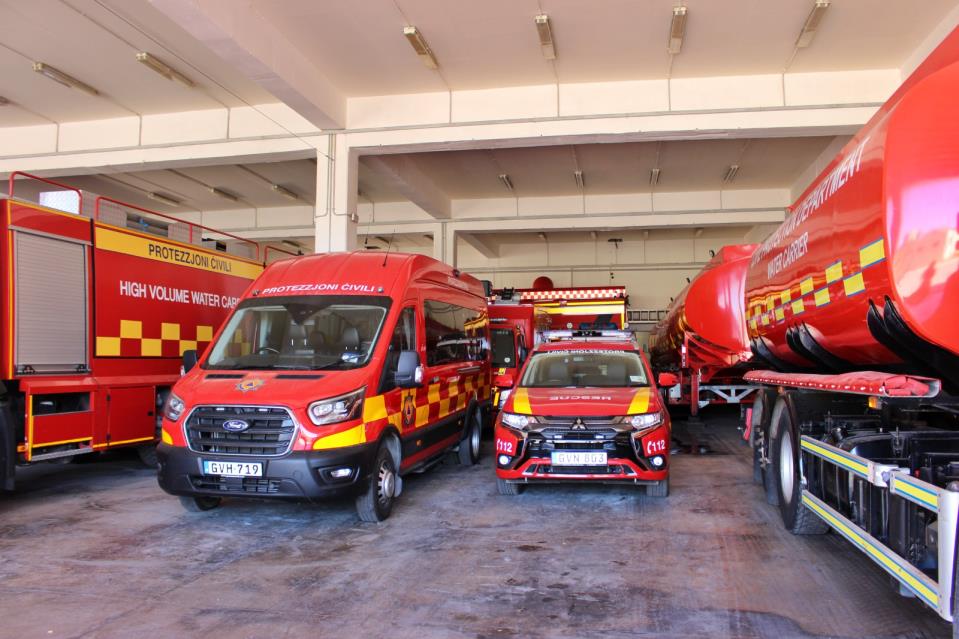Working on the front lines and seeing the worst of the worse, Civil Protection Department officers consistently expressed a sense of pride and dedication for the tireless work that they do.
“It is part of our duty to assist,” Leading Assistance Rescue Officer (LARO) Elvio Briffa said after pulling over to see why there was a stationary car with its hazard lights in the middle of a roundabout.
Although this was a small incident, it was an example of what all officers made very clear – the duty to assist is carried out by CPD officers outside their shift hours in their everyday life.
Talking off camera, Briffa added that even when they are off duty, if a CPD officer sees that something is not right that could be a danger to other people, most would intervene to assist.
“We will stop to help, even a puncture,” Briffa said.
“Our work is not selling pastizzi, when someone phones you to go to work then something happened… if a person is involved then this person could die,” LARO David Spiteri said.
Following an interview with the Director of the CPD Peter Paul Coleiro last month, The Malta Independent on Sunday was invited to go for a ride along with members of the CPD to get a better insight into the work that they carry out on a day-to-day basis.
During the ride along, this newsroom was escorted by Briffa and Station Officer Anthony Micallef to the different CPD headquarters at Ta’ Kanja, Xemxija and Hal Far fire stations, during which time the CPD was called to control two grass fire calls.

The control room – the brains behind the operation
The first stop was the CPD’s control room at its Ta’ Kandja headquarters, which acts as the brains of the operation and manages all the calls that come in.
Upon arriving in the control room, the officers received a call about a garage that caught fire in Qala and a boy who was trapped in a house.
Since this call takes priority, firefighters from both stations in Gozo were sent to the site, Spiteri said.
Spiteri explained that when a 112 call comes in and it concerns the CPD, from the control room they will identify where the emergency is and notify the concerned station/s.
In the control room, the team has access to a large monitor which has the map of Malta. On the map, there are a number of markers showing, among other things, where the individual stations are, where the fire engines are and where the emergency is.
All fire engines are equipped with GPS trackers, so the control room has the ability to track their movements on the map.
Once they receive the location of the incident they pin it on the map and then notify the firefighters where they must go. The fire engines are equipped with a tablet which pinpoints the location and maps out a route with GPS.
However, Spiteri added that even after the fire station concerned is notified of the case, the control room must remain vigilant and offer its help if needed.
Whilst being driven around by Briffa and Micallef, the radio was frequently going off with a number of officers using code words to communicate. At first, one might think that these were all emergencies; however, both Briffa and Micallef explained that most of the calls were from officers notifying the control room that they were leaving one place to go to another.
This information is important for the control room so that it can monitor the number of officers who are present at every station, so as to prevent a situation where there are not enough officers readily available to assist where they are needed.
There could be scenarios where one particular station is overloaded with emergency calls; in this case, other fire stations will be contacted to offer their help.
When visiting the fire station in Xemxija, Chief Assistance Rescue Officer Mark Zammit gave an overview of all the vehicles that the firefighters use and briefly explained how different fire stations are responsible for different localities.
In the case of the fire station in Xemxija for example, it is responsible for any calls that come in the northern part of the island, across to Rabat and up to Cirkewwa.
To help combat grass fires, Zammit said that a Bobcat was brought in. It is a small vehicle that can be used to access difficult locations that larger vehicles would not be able to access. It also has the capability to use a digger and it has forks to, for example, remove any rubbish that has not caught fire yet.
The station also has access to an incident command unit, which would be used for large long operations, Zammit said. This vehicle can increase in size and it can operate as a control room from the vehicle as it is equipped with radios and computers. The front part of the vehicle can then be used as a meeting room to liaise with other relevant departments such as court experts. It also has access to cameras that can work from afar with thermal images.
Asked whether traffic slows down rescues and acts as a hindrance, Zammit said: “The siren helps you a lot, but obviously, because of the issue of traffic, this will lose you a few seconds.” However, he said that the majority of people move to the side when they hear the siren as they understand that there is an emergency.
In the case of road blocks, the CPD are in contact with Transport Malta to obtain information on any road blocks there might be on the route to the site where an accident has occurred.

Frequent grass fires littered with rubbish
In the interview with CPD director Coleiro, a major issue he brought up had to do with the sheer amount of grass fires Malta experiences every year. Currently, because of the high temperatures, the CPD is busy extinguishing these fires almost every day. He said that Malta experiences around 1,600 to 1,700 grassfires a year, which could be accidental or intentional.
Whilst being driven around by Micallef, there were two calls for grass fires - one in Dingli and one in Qormi – which this newsroom observed from a safe distance.
In both cases, Micallef pointed out how it was not only the grass that caught fire but there was also a lot of rubbish which also went ablaze. Talking to Micallef, he said that dumping rubbish, which increases the chances of a grass fire igniting, is a widespread issue that they face when dealing with such situations.
However, both fires were small and the firefighters managed to arrive in time and defuse the situation without any complications.

Working for 24 with their second family
Spiteri explained how the CPD officers work 24-hour shifts.
“During the shift obviously if the officers have work to do then they must do it; if then they have the opportunity to rest they will obviously rest so that they are always energised.”
Spiteri added that in each station since there are a number of people, the workload will be shared between all officers.
However, Spiteri added that since the CPD gets frequent calls for grass fires, on top of all the other calls they would normally receive, the officers “don’t really have a chance to rest.” He said that during this time of year, the officers have to work almost the full 24 hours.
“But yes the second we have a chance to rest, obviously we are not in a hotel, even when taking a nap, your mind would be alert thinking about a call that might come in.”
Although they have days off to rest and recover, Spiteri said that all firefighters would be ready on call if they are called to come in for an emergency.
On a more personal note, he was asked whether working 24-hour shifts and constantly being on call is a toll on his life.
Spiteri said that he has been living this life for nearly 25 years now, so this way of living has become normal in his life. “If they phone you, you go in and you do something, you feel proud”

Spiteri clarified that being called to come in on your off day is rare, but there have been cases where the CPD needed more people so it had no other choice but to call more officers to be on duty.
Another firefighter this newsroom spoke to was LARO Joshua Spiteri who proudly spoke about how he has been a firefighter for nine years. He spent five years working at the fire station at the airport, but then later joined the CPD and after two years he was able to be promoted to leading firefighter.
“This is like my second family; I have no problem staying in these quarters for 24 hours. Like all families we have arguments and we joke.”
“I would like to continue studying and doing this work. With this work no matter how much you learn it is never enough, because every bit of work is never the same.”
Talking to Briffa whilst driving, he also continued on this family culture that is widespread in the CPD.
“If one of us has something going on, maybe in their family, we’ll all step in to help him, no matter what the situation is. Whether it is during office hours or out of hours the officers will always be there to support you. All the time.”
He added that just like in any family there will be arguments, but whenever a call comes in everyone puts their personal issues aside and focuses on the task at hand.